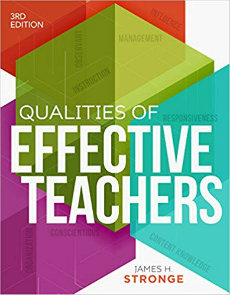Reflect on the Qualities of Effective Teachers
Qualities of Effective Teachers, 3rd Edition
By James H. Stronge
(ASCD, 2018 – Learn more)

Qualities of Effective Teachers, 3rd edition, by James Stronge is the kind of book you come back to again and again. Not for its engaging sense of voice (which it definitely does not have) nor for its engaging visuals (which are similarly lacking), but for its timeless applicability in the teaching profession.

Stronge identifies six qualities of effective teaching: professional knowledge, instructional planning, instructional delivery, assessment, learning environment, and professionalism.
He then further breaks down each quality into subdomains, discusses what it means to be effective in each of those subdomains, and finally explores each quality in relation to three particular groups: teachers of at-risk students, teachers of high-ability students, and 21st century teachers.
Quality 1: Professional Knowledge
Stronge concludes from his research that effective teachers draw from a strong base of knowledge about their profession. This includes a detailed knowledge of the content they are teaching, how to teach in general, and how learning best occurs in their particular content area.
Additionally, effective teachers possess the ability to communicate this information clearly and succinctly to further the understanding of their students. They have been trained to teach in their discipline, and their effectiveness improves with experience.
Quality 2: Instructional Planning
The most effective teachers are also well-planned and organized, and they focus their planning on three key questions: What should be taught?, How should it be taught?, and How will we know if students have learned what we taught? They consider the abilities of their students and design instruction to bolster their students’ knowledge and understanding without compromising high expectations. Goals and objectives are clear, practical, and attainable, and effective teachers use these objectives to assess their students’ abilities and plan further instruction.
Quality 3: Instructional Delivery
According to Stronge’s research, effective teachers flexibly use a variety of instructional strategies, tailoring their choices to their students, their content, and their time and resources. They differentiate their instruction competently, consistently communicate high expectations to their students, promote higher-order thinking, use high-quality questioning, and engage their students in the learning process.
Quality 4: Assessment
Additionally, the most effective teachers design valid assessments that reliably measure students’ progress toward learning objectives. They use this assessment data to guide further planning and instruction. Effective teachers encourage students to self-assess their own learning, and they provide students with and teach students to use meaningful feedback to achieve success. Quality homework is assigned purposefully and used as formative assessment.
Quality 5: Learning Environment
Research further indicates that effective teachers create a positive learning environment that supports students social-emotional growth as well as their academic learning. Classroom management is not left to chance; rather, carefully designed systems are in place and implemented consistently. The classroom is organized to facilitate learning, inappropriate behaviors are addressed quickly, and students are held accountable. The classroom is a place of joy and warmth where risks are taken and students discover how to become effective learners.
Quality 6: Professionalism
The last quality Stronge identifies is professionalism. Effective teachers are professionals who care deeply about their students. They build relationships with them, getting to know them on a personal as well as academic level, and make it clear that they are committed to helping the students grow.
Effective teachers treat the students in their care with fairness and respect, they are friendly and approachable, and they are enthusiastic about teaching and their subject area. They believe that all students can learn and feel personally responsible for ensuring students have the opportunity to succeed.
Effective teachers are lifelong learners who continuously reflect on their own progress and are committed to improving their teaching. They collaborate effectively with colleagues to boost student achievement and communicate frequently with parents.
Creating Effective Teachers
Stronge concludes his work by recognizing that all teachers and all classrooms are unique, and there is no one way for guaranteeing teacher effectiveness. Rather, achieving effectiveness is a continuous process of teacher reflection, adjustment, and growth focused on the universal qualities identified in the six domains above. And, as Stronge so clearly states, “the ultimate proof of [that] effectiveness is student success. When students learn and succeed, teachers succeed” (259).
Though Qualities of Effective Teachers is at times monotonous and could benefit from more relevant real-life examples or case studies, it is a profoundly useful tool for all educators, helping them to reflect on their own teaching or the teaching they may be observing and identifying areas of strength and areas for improvement. Additionally, it is a resource that maintains its applicability year after year, imparting new insights with each subsequent reading.
Jennifer Peters is a middle-level educator with fourteen years experience teaching seventh and eighth grade English in a rural school district. She is currently facilitating a professional learning community for which she developed a process that has been adopted by the district to help teachers effectively plan for student proficiency with identified curriculum standards. She is constantly striving to improve her teaching practice and enjoys helping others do the same. To her, the best reward a teacher can get is to see her students grow and achieve.

































